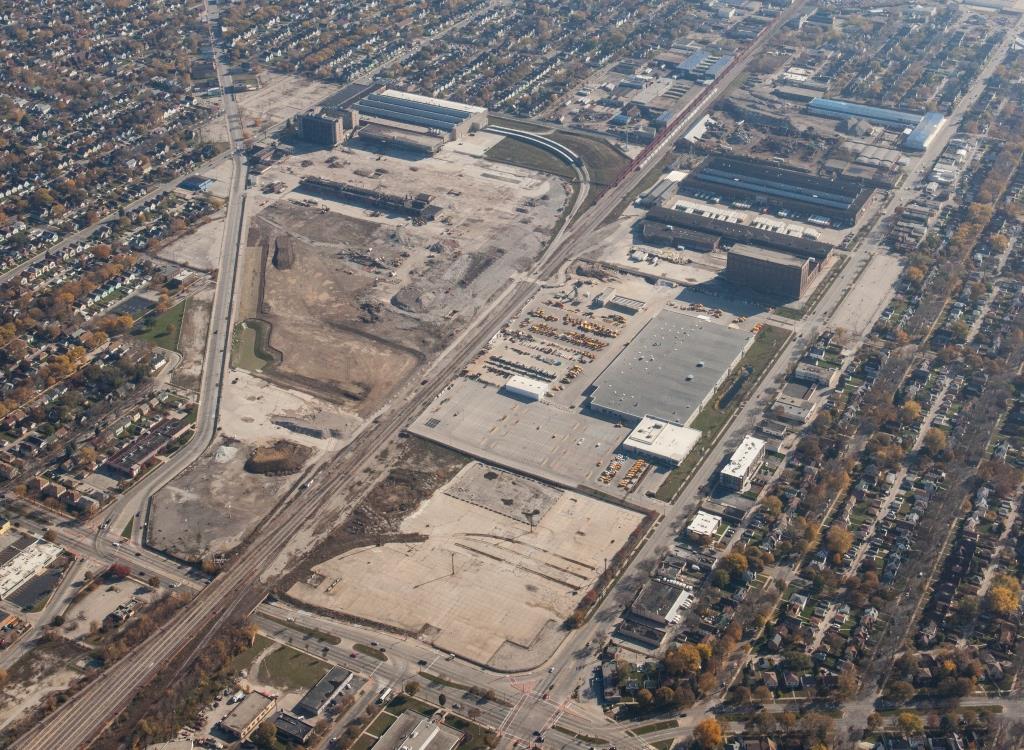Proposal Would Grow Central City Farms
Two Milwaukee legislators envision urban farms rising in 30th St. Corridor.

Aerial view of the 30th Street Corridor. Photo courtesy of the Redevelopment Authority City of Milwaukee.
A pair of state legislators rolled out bills Monday that would transform Milwaukee’s post-industrial central city into a hub for urban farming.
State Rep. Evan Goyke and State Sen. LaTonya Johnson are sponsoring four pieces of legislation in their respective chambers of the legislature. The legislation seeks to create a $10 million educational institution focused on urban agriculture, and greater access to resources for community organizations that work on urban farming projects throughout the city.
“The design and the dream with these bills is that they’re farming areas in the heart of central city and revitalizing the 30th Street Corridor,” Goyke said.
Urban agriculture is one way to work on combating food deserts and shortages in cities. The press conference Monday was held in the Merrill Park neighborhood, which itself is a food desert, said Sherrie Tussler, Executive Director of Hunger Task Force.
Johnson said impediments to residents accessing healthy food require innovative thinking and solutions. Urban farming is one such solution, that can help ensure fresh produce and food for the families that live in areas plagued by food deserts, she added.
“Eating healthy should just be a basic human right,” Johnson contended, “and this legislation is a start in that direction.”
The other two bills being proposed should “cement Milwaukee’s position as a national leader in urban agriculture,” Goyke said.
These bills would create a School of Urban Farming and Nutrition. The new institution would be a space for universities and colleges in the Milwaukee area to research and provide education and degrees in urban farming for students. The ideal location for the school is somewhere in the central city along the 30th street corridor.
“I look at areas around Center Street, North Avenue, Burleigh where you have these large, multi-acre industrial sites that could be remediated and brought back to life,” Goyke said.
Michael Carriere, a professor at Milwaukee School of Engineering, said that urban farming projects, like that being championed in the new legislation, can be tools for community and economic revitalization. They can also be an incredible educational tool, he said. MSOE students are working in communities around the city on engineering problems related to urban agriculture, Carriere noted.
Bonnie Halvorsen, the founder and executive director of the Institute for Urban Agriculture and Nutrition, said that she and her colleagues have traveled to countries like Japan and Cuba where strides are being made in urban farming because of supportive political leaders.
Now that Goyke and Johnson have introduced the bills, they are looking to gain cosponsors and build a favorable coalition as the proposals head through the legislative process. If passed, the project for the school heads to the building commission where it will join a queue of projects jockeying for funding.
Goyke said if the bills pass, the project likely won’t be underway within the next year, but with support it could be realized in the next few years. “The building commission has a line of projects and there’s always politics involved,” he said.
Goyke believes anyone that looks at the urban farming that’s already happening can easily see it’s a positive for the communities. “I don’t think anybody needs convincing,” he said.
“The difficulty is building a broad coalition around the state,” he said, “So that communities outside Milwaukee can see the benefit.”






















This comment is not meant to stir the pot. We need factories not farms. Commerce and jobs will put an end to the food deserts, and population density is the key to a healthy tax base which, of course, funds our schools and other critical society functions. Farms are probably the worst enemy towards our ultimate goals as a city.
Justin, why must it be one or the other? Why not some of both?
You already know that our anti-urban / anti-minority governor and assembly is going to shoot this down. Decrease food deserts? Improve health? Create jobs? Help establish Milwaukee as a national leader in an important field? Nope, we only do that for rural, white communities. I will be beyond shocked if this actually passes.
Honestly, the ONLY way stuff changes is a) redistricting, b) getting out the minority vote with minority representation, and c) removing the unfair weight rural communities have in state politics. Personally, I hope Milwaukee, Madison, and Racine / Kenosha heavily recruits immigrants and refugees to grow its population because these populations are more likely to start businesses, less likely to commit crime, and create more cosmopolitan cities less rooted in WI traditionalism / defeatism.
My guess? Not only will this be defeated, but they’ll make some sort of legislation to ban urban farming because it might hurt rural farmers.
This will be a great opportunity to teach urban students about farming, soils, and related subjects that are imperative for American citizens to understand in order to be responsible voters.
Cool concept, but make them high tech vertical farms -that’s more appropriate for an urban environment.